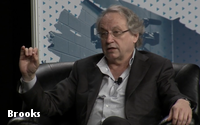 AUSTIN, TEXAS -- Even as taxi and limousine workers
worry about being replaced by technology, Uber and Lyft drivers should start looking for a new line of work thanks to the next generation of technological innovation. Specifically, robots.
That’s what robotics industry pioneer Rodney Brooks predicted during a keynote conversation with New Yorker editor Nick Thompson here Sunday.
AUSTIN, TEXAS -- Even as taxi and limousine workers
worry about being replaced by technology, Uber and Lyft drivers should start looking for a new line of work thanks to the next generation of technological innovation. Specifically, robots.
That’s what robotics industry pioneer Rodney Brooks predicted during a keynote conversation with New Yorker editor Nick Thompson here Sunday.
Brooks said,
“I don’t think many people in this room are going to lose their jobs to robots.” He then predicted that “drivers for Uber and Lyft,” however, would.
The
reason, he said, is that robotic innovation, despite conventional wisdom, popular science fiction and the dire warnings of geniuses like Bill Gates, Elon Musk and Stephen Hawking, just won’t
happen quickly enough to impact human dexterity, intelligence, and cognitive thought enough to replace many higher-functioning human roles.
advertisement
advertisement
Brooks, who is founder, chairman and CTO
of Rethink Robotics, showed a video of the current generation of state-of-the-art robots performing mindless, rudimentary assembly tasks in manufacturing facilities. He then pointed out that, if
anything, the progress of robotic tasks has been moving in the opposite direction.
He noted that robots have gone from sweeping floors (iRobot’s Roomba) to “opening stool
samples” for researchers at the University of Colorado (Brooks own Baxter robot).
“In a way, it’s going downhill,” he said, adding, “We don’t have
the super-intelligent robots that were available in science fiction when I first started in this area.”
When he came to the U.S. from his native Australia in 1977, Brooks said
there were only three mobile robots in the world, but that since then, a company like iRobot has sold 16 million Roombas.
The next big breakthrough, he predicted, would be evolving
from robotic floor cleaners to eldercare. His main reasoning was that the global population is aging and young people simply won’t want to care for geriatric citizens, which will necessitate
robots capable of performing those tasks.
In fact, he described the next generation of self-driving cars as “eldercare robots,” because they will help older people
retain their mobility and autonomy even when they are no longer capable of driving themselves.
Even then, Brooks predicted robots would have relatively little impact on jobs for
humans. He cited the introduction of automated teller machines (ATMs) in the 1980s, which many predicted would put bank tellers out of jobs.
“There are actually more bank
tellers than before. But I’m not sure what bank tellers do,” he quipped.
While it did not address the impact robots might have of on the kind of jobs that ad agency and
brand executives perform, he implied robots would likely have little impact on the labor of the media industry overall.
Asked during the audience Q&A whether robots might soon
replace the editing, writing and storytelling skills of editors like The New Yorker’s Thompson, Brooks said he’s not impressed by the current generation of machine technology that
can write stories and aggregate news content.
“I don’t enjoy the aggregated stories,” he said.